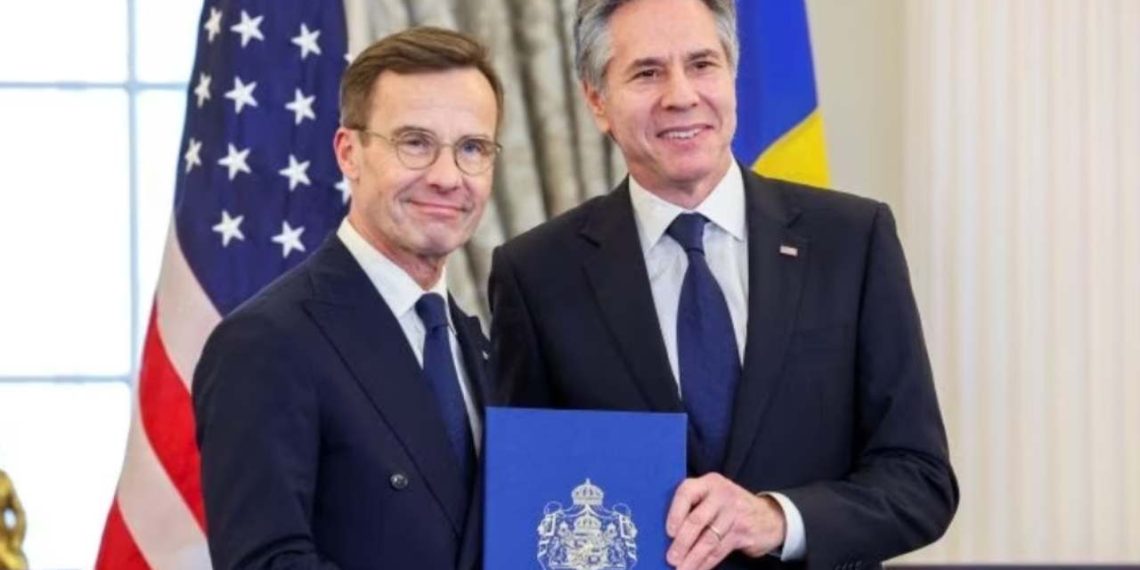Sweden officially became a member of NATO in Washington on Thursday, a decision prompted by Russia’s invasion of Ukraine two years ago. Prime Minister Ulf Kristersson presented the final documentation to the U.S. government, marking the conclusion of an extensive process to secure support from all NATO members.
“Good things come to those who wait,” remarked U.S. Secretary of State Antony Blinken upon receiving Sweden’s accession documents from Kristersson.
He noted a significant shift in Swedish public opinion on joining NATO after Russia invaded Ukraine. Blinken emphasized the gravity of the situation, stating,
“Swedes realized something very profound: that if Putin was willing to try to erase one neighbor from the map, then he might well not stop there.”
For NATO, the accession of Sweden and Finland, the latter sharing a 1,340-km (830-mile) border with Russia, marks the most significant additions in decades.
This move also poses a setback for Russian President Vladimir Putin, who has aimed to thwart any bolstering of the alliance.
Sweden stands to gain from the alliance’s collective defense guarantee, whereby an attack on one member is viewed as an attack on all.
“Sweden is a safer country today than we were yesterday. We have allies. We have backing,” Kristersson said in an address to the Swedish nation from Washington. “We have taken out an insurance in the Western defense alliance.”
Hakan Yucel, 54, an IT worker in the Swedish capital, said of the accession:
“Before, we were outside and felt a little bit alone. … I think that the threat from Russia is going to be much less now.”
In a statement, U.S. President Joe Biden hailed Sweden’s addition to NATO, emphasizing that it makes the alliance “more united, determined, and dynamic than ever.” He noted the significant military capabilities brought by Sweden and Finland to NATO’s ranks.
Sweden contributes cutting-edge submarines and a robust fleet of domestically produced Gripen fighter jets to NATO forces, serving as a vital link between the Atlantic and Baltic regions.
NATO Secretary General Jens Stoltenberg echoed Biden’s sentiment, asserting that Sweden’s accession strengthens the alliance and enhances security for all members. However, Russia has issued threats of unspecified “political and military-technical counter-measures” in response to Sweden’s decision.
Barbara Kunz, a researcher at defense think tank SIPRI, likened joining NATO to purchasing insurance, contingent upon the commitment of the United States as the provider.
While Sweden has progressively aligned itself with NATO over the past two decades, membership signifies a significant departure from its historical neutrality in military alliances.
Despite its tradition of neutrality and advocacy for human rights post-World War Two, Sweden has pivoted towards NATO amid escalating tensions with Russia.
The decision to apply for NATO membership came after years of debate and hesitancy, with the government ultimately choosing to seek security within the alliance. The ratification process faced delays, notably from Turkey and Hungary, due to their close ties with Russia.
However, with Turkey’s approval in January and Hungary’s endorsement following a fighter jet deal agreement in February, Sweden’s accession was finalized.
“I guess (Sweden) had to take a stance really, and I’m happy that we did and that we are safeguarded by NATO because the tension with Russia has been growing for a couple of years,” remarked Carl Fredrik Aspegren, a 28-year-old student in Stockholm.




